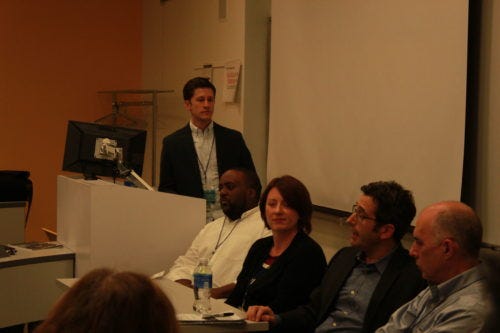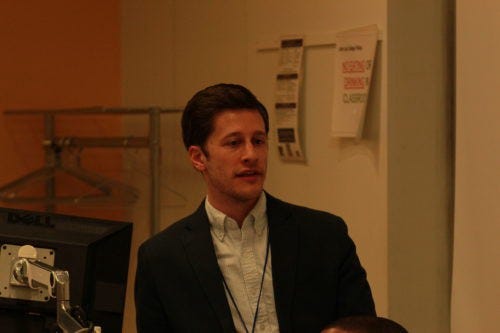The Independent Media in the 2016 Election: Left Forum Day 1
Left Forum 2016 kicked off with Friday evening’s Session A. Among the panels open during the small session was on entitled: The Rise of Independent Media, Perspectives From the Progressive Left.
The panel was moderated by independent journalist David Pakman, whose radio show reaches millions monthly through traditional and online audio and a YouTube show. Panelists were: Benjamin Dixon of the Benjamin Dixon Show podcast, Sam Seder of the Majority Report, Paul Jay of The Real News, and Emmy winning investigative journalist Kate Albright Hanna.
The talk turned, naturally, to the presidential election and the panelists shared their perspectives on the 2016 circus thus far.
[T]he talk began with Pakman asking the panel an intentionally leading question: Was there one candidate this cycle who has benefited from undue and excessive media attention? And was there one whose experience could be seen as the polar opposite?
Jay answered first, focusing on the latter candidate, Bernie Sanders.
“Elections are about what section of billionaires uses the state,” he said. “Sanders- and Trump- are part of pulling the veil back on this process.”
Seder pushed back on the idea that Sanders was excluded by the mainstream media intentionally. Rather, he suggested, the issue was that the Sanders campaign so fully disrupted the established order that it was never given a chance on its own merits.
“There was a bias towards his campaign when it was starting out,” Seder explained. “It was incomprehensible to people that he would do anything.”
Hanna concurred, placing the blame for the media’s dismissal of Sanders on the institution.
“In both politics and media you want to be perceived as a serious person,” she said, “So you’re not going to pitch him in a meeting.”
Dixon said that the way the Sanders campaign was covered in the media was predictable.
“I saw the game they were going to play on Sanders early on,” he said. “Using identity politics to deny a discussion of economic inequality- we see it in the day-to-day whitewashing of people of color supporting Bernie Sanders, for the erasure of the possibility of a Bernie Sanders impact in these communities.”
[P]akman used the idea of identity politics to pivot to Trump. Is the billionaire’s rise due to the identity politics of the white working class?
Seder agreed- to a point.
“When it comes to Trump, the conservative movement is about identity politics. He has run on the vestiges of racism.” Seder said. “His policy choices are not the primary reason people are attracted to him in the Republican Party.”
Jay put the onus on economic insecurity.
Jay referred to TNR’s work on the town of Westminster, Maryland, a town that voted overwhelmingly for Romney in 2012 and calls heroin the greatest problem the country faces.
“It’s an almost entirely white town,” Jay said. And yet, he pointed out, race was not foremost in the minds of the town’s residents.
“So, sure there’s a segment of the Republican Party that is thoroughly racist” and therefore supports Trump, Jay said. But, he argued, the billionaire’s campaign is “more about profound economic insecurity. As his primary campaign went on, it became more about economics.”
Seder pushed back on that characterization.
“Data shows that Trump voter is wealthier than average Democrat, and have a fear of whites being oppressed.” Seder said. “There’s no data to suggest that Trump’s message is resonating primarily because of economics.”
Dixon agreed.
“Racist ideology is pervasive,” he said. “The idea that it’s just economic ideology on Trump’s side isn’t true. The median income for a Trump supporter is $70k.”
[G]iven the fact that the idea of the working class Trump voter is so pervasive, and given that there is data to suggest it’s simply a trope, the panel turned to Hanna to explain how these ideas gain popularity in the media.
Hanna is a veteran of MSNBC and therefore has mainstream media experience.
“It’s similar to a viral meme on the internet,” she said. “People just start repeating it ad nauseam.”
And these ideas don’t come from nowhere, she said. The political campaigns are well aware of their existence. They create the narrative.
It’s for a very simple reason, Jay explained. For the news media, “political campaigns spend more on ads than maybe anyone if you include all the races.” He put the number close to $6 billion.
“Look, there shouldn’t even be a Republican Party after 8 years of Bush,” he said. “But the mainstream news media needs the two party system to survive.”
It’s a cyclical process that shows no sign of slowing.





